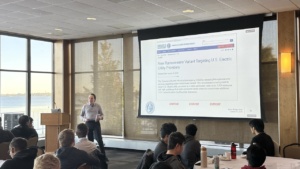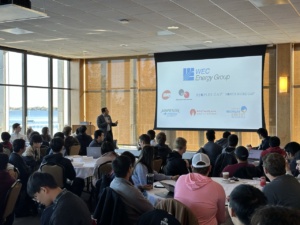
On October 17, 2024, on the shores of Lake Mendota, over 120 students responded to a major cyberattack with the help of government, law enforcement, and military partners. But this wasn’t a real attack. The University of Wisconsin–Madison hosted its third annual student-focused cyber tabletop exercise at the Pyle Center.
And the annual exercise now has a new name: Cyber Badger.
This year’s event simulated a cyberattack on the energy grid, with WEC Energy Group, a Milwaukee-based regional utility which serves 4.7 million customers in Wisconsin, Illinois, Michigan and Minnesota, serving as the utility partner. Over 120 students in Prof. Bart Miller’s Introduction to Software Security (CS 542) took part in this immersive exercise, preparing them for real-world cybersecurity challenges.
Cyber Badger is designed to provide the student participants with hands-on experience responding to complex cyber incidents. Students took on roles in geographic regions around the world, simulating the various organizations and elements that would be involved in responding to a real-world cyberattack on critical infrastructure. The event builds on the success of previous years, incorporating new partners and expanding its scope.
“Our goal with Cyber Badger is to immerse students in a real world cyber scenario, and show them career paths that are interesting and different than the typical ones they might think of,” said Miller, who leads the initiative and co-teaches the course with Elisa Heymann. “This exercise pushes them to think critically and work collaboratively under pressure, preparing them to safeguard critical infrastructure from future cyber threats.”

The exercise was facilitated by Patrick Skufca and Rebecca Faustina from the U.S. Department of Homeland Security (DHS) Cybersecurity and Infrastructure Security Agency (CISA), which designed and executed the scenario. Subject matter experts from WEC Energy Group and its subsidiary We Energies, the Federal Bureau of Investigation (FBI), the Wisconsin National Guard’s 176th Cyber Protection Team (CPT) and Defensive Cyberspace Operations Element (DCOE), the State of Wisconsin’s volunteer Cyber Response Team (CRT), the UW–Madison Division of Information Technology and Office of Cybersecurity, and the Department of Energy’s Sandia National Laboratories, Idaho National Laboratory, and Argonne National Laboratory, guided students through response strategies.
Fueling the event’s success were the insights provided by representatives from WEC Energy Group, who detailed the real-world risks faced by the energy sector and discussed how organizations can build more resilient systems. The cyber experts from WEC Energy Group were Micah Schmitt, David Cermeli, and Adam Kaprelian. We Energies Director of Electric System Operations, Matt Beilfuss, attended the exercise with the team. Beilfuss also serves as Wisconsin’s Deputy Adjutant General — Civil Support.
FBI Supervisory Special Agent Amanda Knutson provided a brief on the real world cyber threats facing the United States, including the 16 Critical Infrastructure Sectors, and discussed how the FBI investigates cyber crimes and works with other government, industry, and international partners.

Dave Schroeder, Associate Director for Intelligence and Security Initiatives for the College of Letters & Science and a Cyber Warfare Officer in the Wisconsin Army National Guard, emphasized the growing importance of public-private partnerships in cybersecurity. “The collaboration between academia, industry, and government at Cyber Badger is key to preparing the next generation of cybersecurity professionals to enter the workforce.”
As part of a continuing effort to align cybersecurity education with government and industry needs, Cyber Badger will return next year, bringing even more students, partners, and new challenges to UW–Madison. “We are thrilled by the progress we’ve seen over the last three years and the creativeness of our students,” Miller said. “Cyber Badger and the partnerships we have built have become a staple in our software security curriculum, and we look forward to the evolution of the event in 2025.”
Cyber Badger helps UW–Madison meet goals aligned with its designation by the National Security Agency (NSA) as a National Center of Academic Excellence in Cyber Research (CAE-R) and its Educational Partnership Agreement with U.S. Cyber Command, which are intended help the nation respond to and prevent cyber events by building a workforce with these skills. For more information about Cyber Badger and other cyber initiatives at UW–Madison, visit https://go.wisc.edu/cyber.